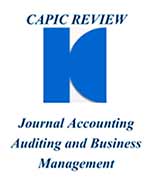ERP technology in the training process of public accountants and auditors in chilean universities
Published 2022-01-16
Keywords
- technology skills,
- public accountant,
- ERP,
- technology
How to Cite
Copyright (c) 2021 Francisco Nova, Fernando Morales

This work is licensed under a Creative Commons Attribution-NonCommercial-ShareAlike 4.0 International License.
Abstract
The present research discusses the relevance of the incorporation of ERP (Enterprise Resource Planning) systems in the training process programs of public accountants and auditors in Chilean universities. The expertise acquired in this type of technology has become a highly demanded competition in the labor world, and for this reason we consider it important to understand its presence and use in the study plans of Chilean universities. This inquiry is based on surveys carried out with teachers and administrative staff in 17 Chilean universities to assess the level of incorporation of ERP in the different stages of university study plans, the level of preparation of the teaching staff and enable an evaluation of the learning experience in the different educational institutions that are part of this study. Among the conclusions, we highlight the good perception of the implementation of these technologies in teaching and their role in the development of transversal skills with an emphasis on accounting and finance despite the multiple options of ERP available, especially SAP.
Downloads
References
- Al-Mashari, M. (2003) “Enterprise resource planning (ERP) systems: A remodels and strategies for practitiones”. The American Journal of Distance Education, Vol. 8, nº 2, 30-42
- Blount, Y., Abedin, B., Vatanasakdakul, S., y Erfani, S. (2016) “Integrating enterprise resource planning (SAP) in the accounting curriculum: a systematic literature review and case study”. Accounting Education, 25(2), 185-202.
- Campos, L. C., Torres, M. D. P. G., & Freire, D. S. (2005) “Informática aplicada a los procesos de enseñanza-aprendizaje” (Vol. 7). Fondo Editorial PUCP.
- Deloitte (2017) “Force of change_ Industry 4.0”. 14p.
- Díaz, A., & Quiroz, R. (2001) “Corrientes pedagógicas, modelos pedagógicos y enfoques curriculares”. Relación sistemática entre ellos. Revista avanzada 10, 116-129.
- Grisanti-Belandria, A. (2017). “Perspectivas de la contaduría pública en los tiempos de la era digital”. Revista Visión Contable, (16), 96-119.
- Gómez-Meneses, F. E. (2014) “Competencia digital en la auditoría. Soporte o carga en el ejercicio profesional de los auditores”. Cuadernos de Contabilidad, 15(37).
- IAESB (2018) “Information and Communications Technology Skills”. IAESB TASK FORCE RESEARCH Online Survey Analysis, January 2018 Version 1.2. Accessible en https://www.ifac.org/system/files/meetings/files/6-4-Agenda-6-4-Updated-IAESB-Survey-Report-IAESB-Nov-2017-mtg.pdf 30p.
- IAESB (2018) “Information and Communications: Technology literature review”. Accesible en https://www.iaesb.org/publications/information-and-communications-technology-literature-review-0 19p.
- IFAC (2019) “Future-Fit Accountants: CFO function financial roles fort the next decade”. Exposure draft. 15p.
- Jean-Baptiste, R. (2009) “Can accountants bring a positive contribution to ERP implementation?”. International Management Review, 5(2).
- Kahale-Carrillo, D. T. (2016) “La formación (española e italiana) en la Industria 4.0”. Labour & Law Issues, 2(2), I-42.
- Lopes De Sá, A. (2002) “Origen y evolución del conocimiento contable. Enciclopedia de contabilidad”. Bogotá: Panamericana.
- Maldonado, G., García, J., y Sampedro-Requena, B. (2019) “El efecto de las TIC y redes sociales en estudiantes universitario”s. RIED. Revista Iberoamericana de Educación a Distancia, 22(2)
- Mora, G. (2014). Dinámica económica y contabilidad internacional: un enfoque histórico. Armenia, Quindío, Colombia: Servicios Académicos Internacionales.
- Shin, N. (2009). Information technology and diversification: how their relationship affects firm performance. International Journal of e-Collaboration (IJeC), 5(1), 69-83.
- Ordóñez, C. L. (2004). “Pensar pedagógicamente desde el constructivismo. De las concepciones a las prácticas pedagógicas”. Revista de Estudios Sociales N°19, 7-12.
- Ordóñez, Claudia (2006). “Pensar pedagógicamente, de nuevo, desde el constructivismo”. Revista Ciencia de la Salud, N°4, 14-23.
- Perkins, D. (1999) “¿Qué es la comprensión? En W. Stone (Comp.), La Enseñanza para la Comprensión: vinculación entre la investigación y la práctica”. Buenos Aires, Argentina: Paidós.
- Salazar, R. (2012) “¿Quién aprendía más? ¿Los alumnos o yo como docente?”, Revista Ventanales. N°2, 114-115.
- Sangster, A., Leech, S. A., & Grabski, S. (2009) “ERP implementations and their impact upon management accountants”. JISTEM-Journal of Information Systems and Technology Management, 6, 125-142.
- Sanjurjo, L. (1994) “Algunos supuestos básicos que subyacen en las teorías y prácticas pedagógicas”. En Liliana Sanjurjo y María Teresita Vera, Aprendizaje significativo y enseñanza en los niveles medio y superior (pp. 19-48). Argentina: Homo Sapiens Ediciones.
- Solari, A. y Monge, G. (1999) “Un desafío hacia el futuro: Educación a distancia, nuevas tecnologías y docencia Universitaria”. Volumen 12.
- Tobón, S. (2010) “Los proyectos formativos y el desarrollo de competencias”. Center for Integrated Facility Engineering (CIFE). México, DF Recuperado de http://www.academia. edu/download/32479367/5_proyectos_formativos.pdf.
- Torres, Á. (2003) “Educación Superior a Distancia. Entornos de Aprendizaje en Red”, edición electrónica, UAM-Xochimilco, México,
- Vásquez, G. (2001) “Contaduría pública bajo la modalidad virtual”. Revista Internacional Legis Contabilidad & Auditoría, 8, 63-87.


































